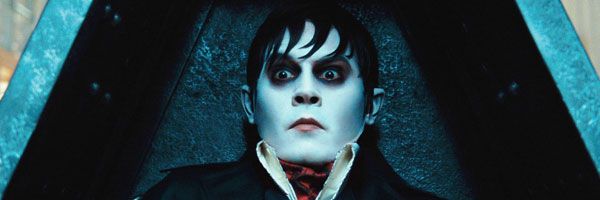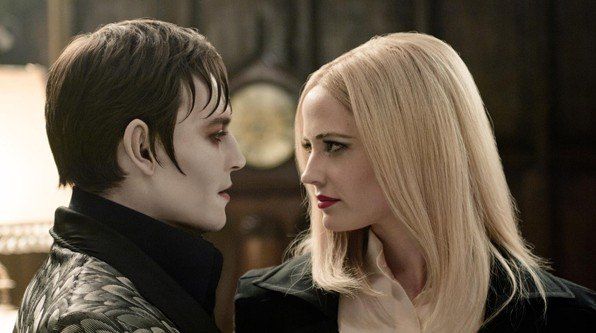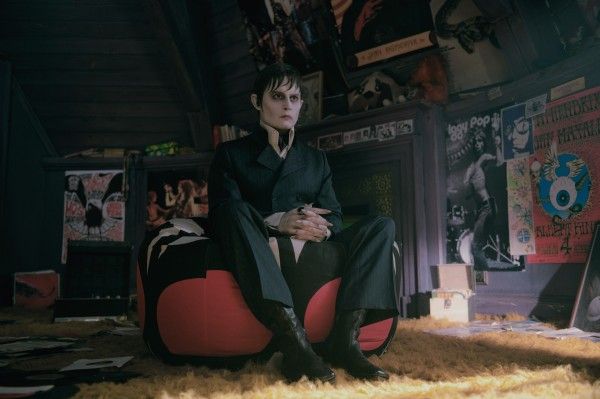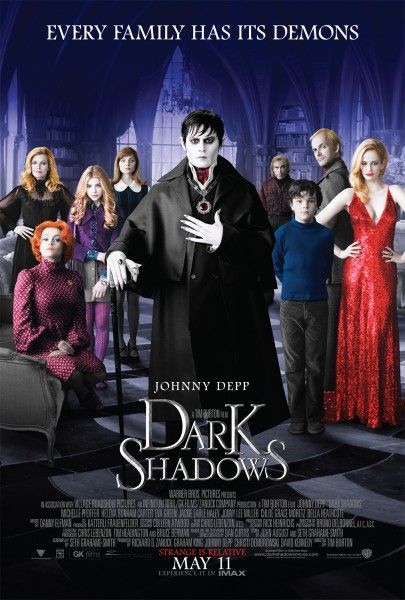Tim Burton's Dark Shadows is a series of flawed assumptions resulting from remarkable incompetence. Burton believes he's blended a gothic style with a campy comedy, but his film is neither. The characters act at being a bunch of kooky, Addams Family-style misfits, but they're nothing more than vague, one-dimensional sketches or, in the case of the protagonist, a confused contradiction. Seth Grahame-Smith's script thinks it has balanced out the story elements into a compelling narrative, but it's a poorly plotted mess that eschews character development in favor of a softball joke or clumsy dark humor. With the exception of a great performance from Eva Green, Dark Shadows flails wildly at concocting a strange brew, and only comes up with weak tea.
In 18th-century Collinsport, Maine, wealthy aristocrat Barnabas Collins (Johnny Depp) makes the grave error of sleeping with his maid Angelique Bouchard (Green), but giving his affections to his class-equal, Josette DuPres (Bella Heathcote). Despite working as a servant, Angelique is secretly a witch (why she wouldn't use her witchcraft to be more than a housekeeper is never explained), and she kills Barnabas' beloved, curses him to be a vampire, and then buries him in a locked coffin. He awakens 196 years later in 1972, and decided to restore his beloved Collinwood manor and the Collins family to their former glory. His ancestors (again, it's never explained how they happened since we never saw any of Barnabas' siblings nor did he have any children) own only a few fisheries, and they have fallen into a general malaise. There's the blasé matriarch Elizabeth (Michelle Pfeiffer), her self-centered teenage daughter Carolyn (Chloe Moretz), Elizabeth's sleazy brother Roger (Jonny Lee Miller), his son David (Gulliver McGrath) who sees the ghost of his dead mother, and the drunken Dr. Julia Hoffman (Helena Bonham Carter), who was hired three years ago to help David with the loss, and instead has been allowed to live in the house even though she contributes nothing. Barnabas becomes smitten with the manor's new governess, Victoria Winters (Heathcote, again), who also sees ghosts. However, the vampire must face off against Angelique, who has maintained her youth and become the town's most powerful figure.
Other than Barnabas and Angelique, none of the characters are deeper than the one word descriptions I offered. Elizabeth: blasé; Carolyn: self-centered; Roger: sleazy; and so forth. The script is painfully confused since it sets up the family to be the focal point and show how Barnabas changes their lives, but then it neglects the entire family to focus on the misadventures of its vampiric protagonist. There's not even a good reason for Hoffman to be in Dark Shadows since she adds nothing to plot and doesn't reveal illuminate the personalities of anyone else in the movie.
Even with superfluous and undeveloped characters, there's still value in trying to let Depp carry the film. Unfortunately, Collins never amounts to much more than a single joke and a giant plot hole. All of Barnabas' comedy comes from the fact that he's in constant culture-shock. At first, it's funny to see him react to paved roads and call Carolyn a prostitute, but then his man-out-of-time act wears thin. Burton and Grahame-Smith also want a blend of dark comedy and pathos, but the mix only creates a gaping plot hole. Barnabas is allowed to slaughter innocent citizens and sap people's free will, but then he laments being a damned creature who can't die. Except he can die. If he felt truly remorseful about killing, then he could just step into the sunlight and burn to a crisp. Apparently, Barnabas feels bad about his crimes, but not that bad.
The only character the film has a good handle on is Angelique. Yes, it makes no sense for her to work as a maid at the beginning when she has supernatural powers, but the character remains consistent throughout. She's a woman scorned, and she's sexually aggressive, but she's also a little pathetic at how badly she wants Barnabas. Granted the movie never provides a strong case for why she would be infatuated with him, but that's where Green's performance comes in. The actress chews the scenery with sultry abandon, and she cleverly gives Angelique an old woman's voice. It's a nice little twist that makes the character both seductive and creepy at the same time.
If only Burton had such success in attempting to blend the gothic and the campy. In some ways, Dark Shadows is Burton exercising some visual restraint. He skews towards the gothic aspects of the visual palette rather than playing up his familiar high-contrast color schemes. When Barnabas attacks the construction workers who unintentionally release him, there's not a trace of Burton's trademark style in the mix. I appreciate the director's desire to back away from becoming a self-parody (or at least more of a self-parody), but he hits a bit of a misstep because he doesn't know how to put his restraint to dramatic effect. Edward Scissorhands is a brilliantly realized combination of humor and pathos derived from a unique style. Dark Shadows lacks that visual imagination, and more importantly, it doesn't build a world worth exploring. With Dark Shadows, he lazily embraces the comforts of popular 70s tunes and an Alice Cooper cameo.
Dark Shadows wants to have its blood and drink it too. It wants to build a cast of interesting supporting characters, but it doesn't want to spend time with them. It wants to be edgy, but it turns around and apologizes for offending. It wants to be funny, but it places the entire comic burden on a few jokes. There's nothing particularly infuriating about the film, because fury would require passion. Dark Shadows wants to be frightful, but it's just frightfully dull.
Rating: C-




